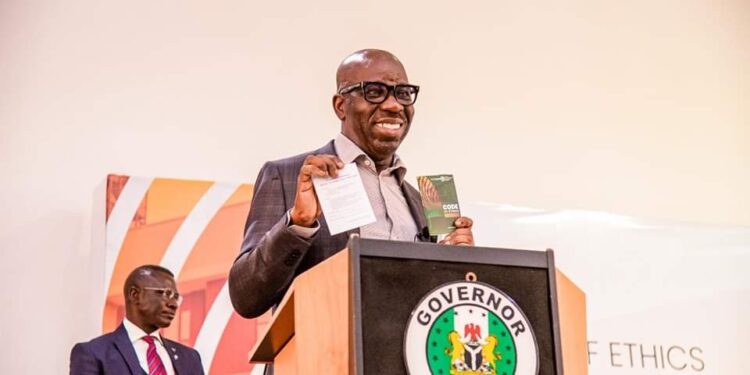EDO —THE Edo State Governor, Mr. Godwin Obaseki, has said his government will partner with the private sector to set up a trust to ensure the sustainability of the Edo State International Film Festival (ESIFF).
Obaseki said this during a Meeting with the Edo State Commissioner for Art Culture Tourism and Diaspora Affairs, Uyi Oduwa Malaka and German student-filmmakers, at the Government House in Benin City.
He said, “We have decided to create an ESIFF Trust and all the activities of the event will be transferred to that trust. It will be driven purely by the private sector. We did it with Alaghodaro where we have a trust; they raise their money and have full government support and help the government promote and attract business to Edo State.
“I have mandated that we create a trust manned by those in the creative industry to give direction to this body, which will be responsible for promoting the film festival. We will still give support until the trust can stand on its own and carry out its activities.
“We are ready to work with you in the film academy as this is a natural progression from the film festival. All the facilities will be transferred to the trust; you have the responsibility to raise additional money and make investment.”
Hailing the German Government for the support for his administration, leading to the successes recorded over the past seven years, including in the fight against illegal migration and human trafficking, the governor said, “Our efforts have yielded fruits in the last seven years, especially in the creative industry. We have attracted support and we will soon be exporting people with skills to Europe and other parts of the world.
“We have moved from desperation, created hope and now actualizing the hope with our creative industry, using it as a platform for our youths to showcase their talent and export the same to the world.
“The State has significantly made progress in the creative industry and the German government has supported us in the area of job creation from manufacturing, technology and other areas to encourage our youths to remain here to develop the State and nation.”
He further stated, “We have also got interventions and support in the creative industry to support our youths in the creative business and we are growing tremendously in the industry.
“We started the Edo International Film Festival last year and never knew that we were doing something remarkable that would bring people across the country and outside into the State.
“This second edition has made me know that we have created a marketplace for films where producers and stakeholders in the industry meet. We have created a place and a platform where exchange takes place, where people who are selling and distributing products meet young stars, give them products and direction on how to succeed in the Industry.”
According to him, “The Edo International Film Festival has become the premier festival and a marketplace for the exchange of film products in West Africa, producing real content as we are developing real people, skills, and talent to do production across the Country.
“For the assistance and collaboration with the German Government, I want to use this opportunity to thank the German Minister of Culture; she has been an amazing friend to the State and has made the partnership possible as we have a positive impact on the cultural exchange programmes and other collaborations with the German Culture Ministry. These exchange programmes are really remarkable.”
“I hope we can have a mechanism where those trained in these exchange programmes have the responsibility to form a faculty to train other youths in the State and Nigeria to enable us continually have knowledge transfer,” Obaseki charged.
On her part, Uyi Oduwa Malaka said the partnership between the State and Germany has given birth to cultural exchange, adding that “the journey has been the one of a lot of cultural exchange and learning as the German student filmmakers have been in Edo State for 21 days shooting at various locations across the State.”
Also, Mr. Mark Szilagyi of the Filmakademie Baden-Worttemberg and leader of the delegation, commended the governor for his sustained investment in the creative sector and for supporting young people to realize their full potential.











